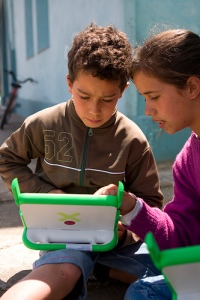On Tuesday the President of Uruguay, Tabaré Vázquez, and his suite visited Escuela 28 / 80 in Montevideo to hand out the last Ceibal XO, as electioneering events are on their last days for presidential elections scheduled for October 25 in that country. According to the Constitution, the President is not to do political campaigning, so he merely indicated that this was another "promise fulfilled". The main candidate for his party was noticeably absent.
It has been announced that this number, 396,727, is the final count of XOs that complete 100% coverage grades1 to 6, for 2.332 public schools of which about 1.900 have connectivity. I am encouraged in terms of quality of information that it was noted to the press that this program does not yet cover directly private schools, though there is a sliding scale according to each private school fee structure to encourage them to join, in some cases at no cost.
Kudos and Criticisms
Interestingly, the main opposition candidate, Luis Alberto Lacalle, a former president of Uruguay, does indeed cite Ceibal as the best thing Vázquez did as president, when trying to show that he can manage to find something nice to say about the current government. "A marvelous thing of Dr. Tabaré Vásquez", he said as a guest of an Argentinian TV program widely distributed in the region.
Mr. Lacalle also quickly dismissed growing complaints about lack of training for teachers to prepare them for Ceibal. This "forberance" should not need surprise anyone, because during the Lacalle government computer labs were started in every major high school in a program beset with scandal, inefficiency, and a depth of denial that so far Ceibal has not reached even in its worst days. It is unclear Lacalle would do better this time around, if elected, but my opinion may be biased, see disclaimer below.
"El País", the main newspaper of the "blanco" party of Mr. Lacalle, does give prime time to a collection of criticisms to the Ceibal plan. Some of those critics echo concepts we are used to hear already, for they are mostly true: the XO is not a magic formula, more training is needed, evaluation is good.
It really takes away a lot of their credibility, the fact that those criticisms are voiced by people who when they were in power did not implement those very same policies they are now claiming for. Of especial note is Mr. Rama, candidate for senator for the Colorado Party, and once the top guy for Education in Uruguay, whose swiss-cheese education reform that even included replacing English with French as main foreign language in education in the mid '90s was lacking the very elements he now says are so obviously necessary for any education project...
All in all, in our part of the world where we have learned to beware of "Mission Accomplished" banners, we are glad for what did actually happen in Uruguay, which is that a lot of kids got to have this "pedacito de cielo" ('little bit of sky', a poetic name given to the XOs in Uruguay) at least for a while. For what remains to be done, which is to actually make these things be of some use in class and for learning, we are ready and willing to help, though I am unsure Uurguayans really need our help: if Uruguayan authorities would just listen to their own teachers, they could do incredibly Good Things.
Of course, administrators would have to look beyond the "safe" teachers, the ones that get promoted because they seldom made a mistake. It should be known that the lack of mistakes usually means they seldom ever tried to do something, not that they are actually any better. So far the job positions of "Ceibal Motivators" have been filled by seniority, by mostly quite safe people.
Full disclosure: Yama Ploskonka once ran for office in Uruguay with the Colorado Party, nowadays an almost defunct political force. He also wrote and published Breves apuntes para una introducción al cambio...calidad educativa a book critical of the Rama reform and of the ill-managed INFED2000 computer labs project, available for free download. He's not tame yet.




Uruguay is part of the One Laptop Per Child scheme, an organisation set up by internet pioneer Nicholas Negroponte. His original vision was to provide laptops at $100 (£61) but they proved more expensive.
The Uruguay programme has cost the state $260 (£159) per child, including maintenance costs, equipment repairs, training for the teachers and internet connection.
The total figure represents less than 5% of the country's education budget.
Around 70% of the XO model laptops handed out by the government were given to children who did not have computers at home.
"This is not simply the handing out of laptops or an education programme. It is a programme which seeks to reduce the gap between the digital world and the world of knowledge," explained Miguel Brechner, director of the Technological Laboratory of Uruguay and in charge of Plan Ceibal.
Laptop for every pupil in Uruguay
Congratulations to Uruguay,
Having the vision and the fortitude to do what is right for children and educators. Our team from the Eastern Townships School Board is currently in Uruguay, have visited schools and met many teachers. Their feedback: Wonderful Commitment and Desire to make the Plan Ceibal a success.
Congratulations to Shirley Siri, Maria Ines Gil and the former ambassador to Canada, Dr. Alvaro Moerzinger, for making our partnership a reality that enrichens the lives of all involved, in both countries, Uruguay and Canada.
Very very impressive!
I hear they are working on distributing XOs for middle school and high school kids too.
Maybe XO 1.5 can be focused more for high school kids.
an OLPCNews Exclusive! a video of the event (actually not quite, this is done/hosted by the Presidency of Uruguay, expect slow download, but since no one seems to have posted this yet for the public, our privilege to bring it to you)
http://www.presidencia.gub.uy/_web/video/2009/10/vid_131009_ceibal.WMV
The Last XO in Youtube: http://www.youtube.com/watch?v=5DztzQEqRyc
Anyone has statictics on how much the entire project cost?
Any prove students are using them effectively?
How are they incorporating XOs into their existing education system
How often do they use the XOs
How many subjects are used?
Having the XOs and getting children not exposed to computers excited is one thing... to use them effectively in modern day school environment is another.
yet to hear of one case that has effectively incorporated such devices into the schools system.
Perhaps someone in the know can tell us about this project?
Have the students excel in anything area yet?